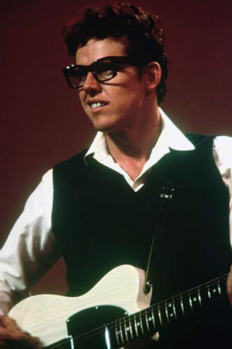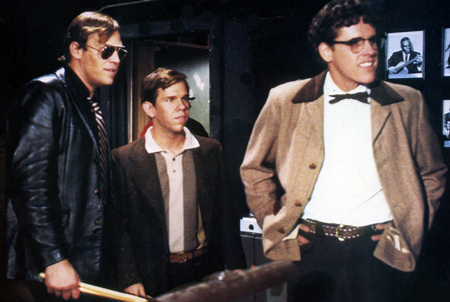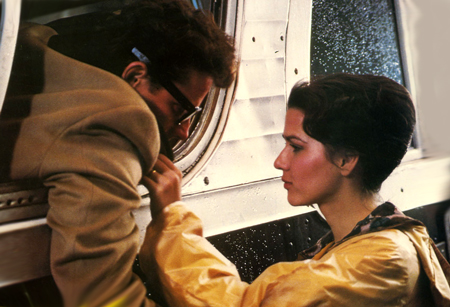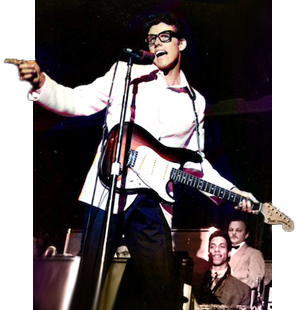Reviewed by Glenn Erickson
The musical biography subgenre was mostly a joke back in the Golden Days of Hollywood, when Louis B. Mayer put out expensive, music-laden fantasies about everyone from Johann Strauss to Rogers & Hart. "Fictionalized" stories were often complete fabrications. Practically nothing said or shown about a composer, songwriter or performer had anything to do with the truth. Alexis Smith and Cary Grant must have had some strange thoughts while filming Night and Day, the story of the romantic problems of composer Cole Porter.
In the 1970s a short stack of popular movies did right by some pop musicians and songwriters, not necessarily getting all the facts correct but pretty much nailing the appeal and spirit of their subjects. Sissy Spacek in Coal Miner's Daughter was the big winner, but there's also a fine Jessica Lange as Patsy Cline in Sweet Dreams and a great TV movie with Kurt Russell as Elvis. Possibly the 'least likely to succeed' of this bunch of winners is 1978's The Buddy Holly Story, a marvelous entertainment package. Young actor Gary Busey is seemingly transformed by lightning into everyone's vision of the original rock 'n' roller from Lubbock, Texas.

It's 1956. Just out of high school, Buddy Holly (Busey) and his fellow garage musicians Jesse and Ray Bob (Don Stroud & Charles Martin Smith) are in a bind with their 'be-bop' music -- the radio show they work for will no longer play them because the sponsors object, and the word from the church pulpit is that they're all going to Hell. An audition in Nashville flops because the producers insist that they play Hillbilly slop instead of the forbidden "nigger" music. But a demo record mistakenly released to some New York radio stations brings them to the Big Apple in style, as 'Buddy Holly and the Crickets'. Holly and his teammates have their triumphs, as when they're mistakenly booked into the Apollo, which plays only black acts. They also endure internal rancor when Jesse becomes jealous of Buddy's star status. Barely two years into his career Buddy has married his sweetheart María Elena (Maria Richwine) and is well into experimentations with overdubbing and adding unusual instruments, like violins. The boys break up, but Buddy is true to his word and allows his friends to keep the Crickets name. Then record label manager Ross Turner (Conrad Janis) talks Buddy into doing a winter tour...
The Buddy Holly Story is not an expensive movie, but its producer Freddy Bauer and director Steve Rash get almost everything right. There is probably a page on the web that lists the film's every anachronism and outright fabrication in the short and happy career of the Rock 'n' Roll god who inspired the song American Pie. Garrison Keillor is also a huge, vocal fan of Holly's. Not being a Buddy Holly expert, I don't know if the name "The Crickets" came about because of a real cricket or if their first record was a hit before they had a recording contract... a mistake that in the movie provides the leverage for Holly to demand immediate self-producer status. Did he really hold a tooth together with bubble gum for his appearance on The Ed Sullivan Show? And I did hear that the Holly-Crickets split was really about a money dispute, right up to the end?

The only detail I can jump up and cry foul on is a scene were Buddy and María go to see a 3-D movie. By '57 or '58, they were gone, gone, gone. 1
Big deal. The movie presents such a vivid image of Buddy Holly that, like James Stewart in The Glenn Miller Story, we don't want to know the ugly details. Gary Busey's sensational Holly goes beyond impersonation. All most of us remember are the records -- which played constantly until the AM radio oldies market dried up -- and still photos of the gangly, cheerful performer. Even in stills Holly projected something that negated the Dork Factor -- he was anti-matter cool. When he sang about "Peggy Sue" in hiccup mode, it felt like a mainline to Rock roots, not a novelty affectation. Gary Busey's performance convinces completely. He reportedly lost a lot of weight to approximate the real Holly's rail-thin appearance. And how can one not like a guy who is performing professionally before he learns that his music is called Rock 'n' Roll, and not 'Rock or Roll'?
A main factor in winning us over is that Gary Busey does all of his own singing, live. We're told that Busey -- as well as Don Stroud and Charlie Martin Smith -- also played their own instruments, which if true certainly impresses me. The recorded-live music performances bring the show to vibrant life. Nothing is more deadly than watching Susan Hayward lip-sync to Jane Froman vocals in With a Song in My Heart. The Buddy Holly Story sounds authentic.

The script by writers Robert Gittler and Alan Swyer has no dead scenes. The mainstream condemnation of Rock 'n' Roll is nailed from several angles -- a furious sponsor, a disapproving minister, a racist Country Music producer -- and then set aside. We don't get scenes of Buddy returning home to fame and fortune; he instead barely has time to go shopping for a custom Cadillac. Jesse's bitterness is established and then not dwelled upon, as are several other musical bio clichés that come and go without unnecessary emphasis -- like María's poignant pregnancy.
Instead we leap from one fun moment to another. Dick O'Neil (The Taking of Pelham One Two Three) is marvelous as the owner of the Apollo, who thinks he'll be lynched for putting a white band on stage. Holly and the Crickets of course ace the acid test -- the black kids love his style, which arguably doesn't rip off black stars as much as did that of other white-bread rock 'n' rollers. Joining popular singing star Sam Cooke on tour, the band checks into a black hotel -- where Ray Bob pretends to be Sam's valet.

As most viewers will know where The Buddy Holly Story is going, the filmmakers have the problem of leaving the audience without too much of a downer. Golden Age musical bios were notorious for overplaying the bathos angle. In Sweet Dreams Karel Reisz winds things up with a surprise mountain encounter, already having tricked viewers with an auto accident that barely seems survivable. I honestly forget how the later La Bamba (1987) handles the exact same events as this film; Twilight Time has just released that musical bio on Blu as well. Director Steve Rash finishes his film with a medley of tunes plus bits of scenes that show our leading players happy and laughing. The end credit music is fairly low in volume, affording audience members in the know to explain the 'unseen' climax to their friends. The movie ends with the feeling that we now 'know' a special entertainer who had a very brief, shining career. 2
The Twilight Time Blu-ray of The Buddy Holly Story is in great shape; Sony's film managers have come up with a transfer that betters the grainy, greenish CFI print I saw in 1979. The snappy audio track has been remixed in 5.1, from the original 4-track stereo.
Jilie Kirgo's liner notes on the insert pamphlet communicate the deep impact that Buddy Holly had on the development of Rock 'n' Roll. She also digs up production info that makes the filmmakers' biggest feat seem to be getting through a lot of legal and financial red tape, just to depict the famous musician on film.

Not having seen earlier releases, I don't know if the feature commentary made its debut on the 1999 DVD release or a later disc. Director Steve Rash talks about the budget, and Gary Busey chimes in on the subject of improvisation and the idea of making things 'real'. Busey does surprise us when he suddenly breaks out with a pro-Christian statement about music and his newly found faith. But he doesn't belabor his comment. In the very first scene the commentators remark about the film's early use of the revolutionary Steadi-Cam rig, that allows the cameraman to walk the camera right up the front steps of a roller rink and into the auditorium. Nowadays we take such shots for granted... if a director has three static cuts in a row, he's asking for harsh criticism.
On a scale of Excellent, Good, Fair, and Poor,
The Buddy Holly Story Blu-ray rates:
Movie: Excellent
Video: Excellent
Sound: Excellent
Supplements: Isolated Score Track, Commentary with Steve Rash and Gary Busey, Julie Kirgo liner notes
Deaf and Hearing Impaired Friendly?
YES; Subtitles: English
Packaging: Keep case
Reviewed: September 11, 2014
Footnotes:
1. Nit-picking: Perhaps Jack Theakston and Bob Furmanek remember an example of a New York 3-D release in those years. That doesn't matter, because the dialogue belongs in late 1953 or '54: Holly talks about the fad not lasting long.
On the other hand, John Ford's The Searchers was released in March of 1956, which gives Buddy plenty of time to adapt John Wayne's line "That'll be the day!" as a hit song.
Return
2. "Plus bits of scenes that show our leading players happy and laughing." For a moment it looks as though we're being set up for a replay of the (good) Maudlin end of The Glenn Miller Story, with a reunion of friends suffused with teary melancholy. Director Rash wisely leaves things up in the air.
Return
3. Response and link from correspondent William Lund, 9/13/14:
Hi Glenn, Great review of this film which I love. When I covered the 1950s in my U.S. History class, I traced the development of Rock 'n' Roll using this film. The kids just loved it. I had several would-be guitarists who appreciated learning about the development of the music and also the live playing by the band. Many kids were truly shocked by the film's ending.
Here's a YouTube link to the BBC's docu The Real Buddy Holly Story, narrated by Paul McCarthy, who owns the Buddy Holly Music Catalog. Take care -- Bill Lund
Return

Text © Copyright 2014 Glenn Erickson
See more exclusive reviews on the Savant Main Page.
Reviews on the Savant main site have additional credits information and are often updated and annotated with reader input and graphics.
T'was Ever Thus.
Return to Top of Page
|


